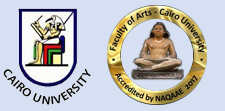عنوان المقال عربي
ملامح الحسن في الجوازات النحوية
Document Type
Book Review
Keywords English
Permissibility, Commendation, Goodness
Abstract English
Research Boundaries and Objectives: Grammatical adjudications levels are three as follows: Obligatory, Permissible and Forbidden. The permissibility has three levels, the highest is (The Goodness), which reaches below the obligatory level and the fundamentalists indicate it as commendable deeds, and the lowest level is the (shameful) which reaches below the forbidden level, and the fundamentals indicate it as (Disapproved dead). The commendation was one of the important subjects of study for Arabizers. The research seeks to describe the methods of commendation, demonstrate the pillars on which the commendation is based on, and deduct its most important purposes. Research Methodology: The researcher adopted the analytical descriptive methodology. Main Findings: The findings revealed that the commendation is a decent method of lofty goal and noble purpose the Arabizer seek to reach it, as to open broad prospects to reflect the meanings of Koranic verses including the miracles. The commendation activate the brain as it includes syntax aspects absorbed in its meaning and allowed to the eloquent use. The Arabizers showed the commendation in the most beautiful aspect, as proved in their language as per their linguistic levels, maintained their differences and contradictions in its practical framework, the permissible aspects can't be acquitted and can't be avoided by the statements of their contradictors, but the proof is followed without prejudice to any other aspect for any reason for which the reflectors can see any of its aspects. The foregoing are the most important purposes of the commendation.
الملخص العربي
إن للنحو العربي في تراثنا أحکاما عدة على النص، والحکم في معناه الظاهري سلطة، «ومفهوم السلطة يمکن أن ينير لنا بعض الأعماق»([1]) وتلک الأحکام التي سيطرت على النص من کل جهة فأزالت الشک والشبهة في نفوس السامعين أو القارئين، کان مردّها أدلة قوية أيدتها ، وحفظت النص من الشوائب التي قد تلحق به، أو فلنقل حفظته من تأويل يذهب به إلى مذاهب غير مرادة من صاحب النص.ولما کان للنص القرآني قدسيّة خاصة ، وکان لکلامه سبحانه وتعالى تأويلات عدة أرادها لعباده، فقد جرى عليه الحکم النحوي بمراتبه الثلاث، الواجب ، والجائز ، والممتنع.ومرتبة الجواز هي المرتبة التي تظهر الأوجه المختلفة للحکم النحوي على النص، فيما يقبله التأويل أو المعنى، وتظهر عبقريّة اللغة، وسعة إدرکِها، وتأويلاتِها المتنوعة، وتظهر من ناحية أخرى عبقرية علمائنا، ونضوجهم الفکري في تناول النص القرآني، وسعة أفقهم في قبولهم لأکثر من حکم يدور مع تأويل النص، وکثيرا ما يستحسنون وجها نحويا بعينه دون إلغاء ما ليس بقبيح أو ممتنع.وأعلى درجات مرتبة الجواز (الحُسْن) ، وهو الذي يصل إلى حد ما قبل الوجوب، ويُعبر عنه الأصوليون بالمندوب، وأدنى هذه المراتب (القبيح) ، وهو الذي يصل إلى حد ما قبل الممتنع، ويعبر عنه الأصوليون بالمکروه.ومادة هذا البحث هي کتب إعراب القرآن ، بداية من کتاب معاني القرآن للفراء (ت207 هـ) إلى کتاب الدر المصون في علوم الکتاب المکنون للسمين الحلبي (ت 756هـ) ومع اختلاف مناهج مؤلفي کتب إعراب القرآن من ناحية ذکر الأوجه الجائزة والاستحسان منها ، أو إخراج الأوجه الجائزة عن حيّز الجواز والاستحسان إلى حيّز الترجيح وارتفاع وجه وإسقاط باقي الأوجه بالتضعيف، أو عدم ذکر الأوجه الجائزة والاکتفاء بالراجح ، فقد کان النظر والتتبع للاستحسان من الأوجه الجائزة محلا للدراسة ؛ يسعى الباحث إلى وصفِ طُرُقِهِ ، وبيانِ ما يستندُ عليه ، واستنتاج أهم مقاصده. وقد اعتمد البحث على المنهج الوصفي التحليلي في دراسة جوانب الموضوع ، وإبراز مافيه من رؤى نظرية وتطبيقية.
Recommended Citation
Al-Mubaraki, Ibrahim bin Hadi Mohammed
(2019)
"Research Title: The Aspects of Goodness in Grammatical Permissibility.,"
Journal of the Faculty of Arts (JFA): Vol. 79:
Iss.
4, Article 11.
DOI: 10.21608/jarts.2019.81814
Available at:
https://jfa.cu.edu.eg/journal/vol79/iss4/11
Digital Object Identifier (DOI)
10.21608/jarts.2019.81814
Accept Date
2018-04-12
Publication Date
10-1-2019

